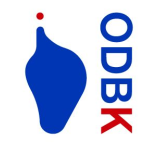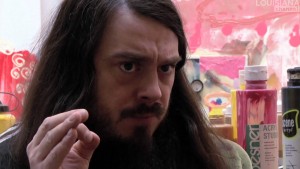Click here to participate en the Pure Taste Indicator of Jonathan Meese

He is one of the most known contemporary German artists.
He was born on January 23, 1970 in Tokyo, Japan, his father was German and his mother who survived him was born in Wales. He lived in Japan until the death of his father returning to Germany in 1988. The funny thing is that when he returned to Germany he did not speak German, so it was difficult for him to adapt to this country. He studied at the Art University of Hamburg from 1995 to 1998 with prestigious artists such as Franz Erhard Walther, Daniel Richter, Martin Kippenberger, Horst Janssen, without finishing his studies. Daniel Richter recommended him in one of the most prestigious art galleries in Berlin and Germany Contemporary Fine Arts. Another key point in his career was his participation in the Bienale de Berlin in 1998 curated by Klaus Biesenbach, Hans-Ulrich Obrist and Nancy Spector.
Concept
I could not find an “artist statement” on Jonathan’s website or in google written by him but I found several interviews from which I could draw some of the main concepts on which he bases his artistic work.
Jonathan does not create works based on a model or aesthetic line but on a philosophy, he says: “Art is total order. Art is the Total Order of the future. Art is the most radical future! (Art is total love, art is total respect) “*
He sees art as the model to escape from the system (or the matrix) since for him “art” is outside it. His creative process is based on this attitude outside the system, which pretends not to have ideologies and therefore develops his works with a mentality outside conventions.
“The” dictatorship of art “is the guarantee of survival, art has no cynical aspects, art is always the future, art is the master, art destroys all ideologies, art is the leader, art surpasses all ideologies, art says no to all politicians, rules of art, art leads and art takes over! “
Jonathan appropriates propagandist elements of oppressors and makes a strong criticism of historical figures from Germany. But at the same time, he creates and works with an anti-authority and as if he were a child or adolescent playing. In his phrase “The dictatorship of art” he proposes art as a dictator to create order and survival since he considers art as the evolution and the sum of all evolution and ideologies as the enemy of it.
“Artists must work in their workshops without disturbances. Artists must be hermetic! Artists should only rely on art, not politics. Art is not another political system. Art is stronger than all politicians. Art is not anarchy. “*
Jonathan highlights his distrust of the political and economic systems that govern our society. And as I mentioned earlier, he sees art as the system that provides the path to freedom because, as he mentions, art is freedom. So in his creative process and in his work he seeks to transmit this state of freedom.
Work
Jonathan is a multidisciplinary artist: painting, sculpture, drawing, performance, collage, video, installations. His work has total congruence with what he prays and preaches: the freedom of all institutional thought and conventions. In his paintings and drawings he mixes figuration, abstraction and texts, uses German military iconography. Clearly we can see in his work that attitude of child or adolescent playing. He is often even accompanied by his mother in creative processes, such as in his studio painting or in his performances. On the other hand many critics mention the art of Jonathan as Art Brut (Art Brut) as that type of art that delineates a border with madness.
During his performances, he has used a bicorne, “killed” an alien doll and made the Nazi salute, an illegal act in Germany for which Meese was tried and acquitted in 2013. (“Art has triumphed!” He said in response) *
[Best_Wordpress_Gallery id=”17″ gal_title=”Jonathan Meese”]
Artistic importance (importance for the art world)
The work of Jonathan and his creative processes are appropriations of other creative processes that were previously used as are the dictatorial propaganda processes or leaders and oppressors. Many artists in the history of art have been multidisciplinary and have used appropriations to create and develop their work. I have been researching and I think that the most original thing that he creates are the collages that extend through the walls of the galleries and museums. So also the originality of his concept and courage in challenging the German authority, the institution and the system. However, we must not forget that he conveniently allows himself to be absorbed by the same system of the art market, subject to speculation and which in his work does not reflect this questioning. His work definitely has its stamp, personality and originality, but does not provide an important contribution to the art world.
Social, political, economic and cultural significance
Definitely Jonathan has been and will be an inspiration for many other artists of this generation and will be for others of future generations. He has become a leader and an example for his courage in revealing himself against the institution and the system. He has given many art theoreticians, critics, reporters with his personality and his work to talk about. He tries to put his finger on the wound of the system, as I have read the same fate (since he was invited by theater producers to participate), which led him to the theater to perform these performances. She has invited her mother to participate in some of her first performances, but she mentions that the one who is acting is not her son but is transformed during the performance in another person. So I think that it is really original and it is not that it seeks to attract the attention of the media for its convenience.
Click here to participate en the Pure Taste Indicator of Jonathan Meese
*Jonathan Meese talks to Ross Simonini, Art Review Marzo 2018

